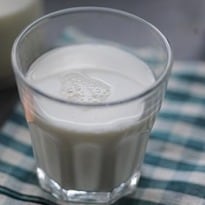Real whole milk from grass-fed cows is creamy, nutritious and utterly delicious...
Our shelves are stacked with white water labelled as milk, from cows pumped up on imported cereals and barely see, let alone chew, a blade of grass. But never confuse this with real whole milk as nature intended it, from cows that graze outdoors most of the year; it's another proposition entirely.
The intrinsic flavour of free-range milk comes from the cows' grassy diet, which produces its mouth-filling viscosity and richness. If you can buy such milk unhomogenised (not processed to disperse the fat throughout the milk), it will naturally form that glorious creamy "top of the milk" collar that families used to fight over. Despite the authorities requiring it to carry a health warning, "raw" (unpasteurised) milk has a loyal following convinced of its taste and health superiority.
Why is free-range milk good for me?
A treasure trove of protein, vitamins and minerals, whole unskimmed milk is one of the most nutritionally complete foods. Science is confirming that milk from pasture-fed, free-range and organic cows is more nutritious than that from cows kept indoors and fed cereal rations. A number of studies have now found that organic milk has more fat-soluble nutrients - omega-3 fatty acid, Vitamin E and beta-carotene - than non-organic milk, as well as a healthier omega 3:6 ratio (skimmed milk does not have these nutrients). The most recent and scientifically robust study is by Glasgow and Liverpool Universities, which found that UK (whole) organic milk has on average 68% higher levels of the essential fatty acid omega-3 and a healthier omega-3:6 profile than non-organic milk.
Some new Dutch research provides us the first proof of an actual health impact from organic food. This peer reviewed study shows that if infants up to two years old and their mothers eat organic dairy foods, then the infants suffer a 36% lower incidence of eczema (a type of allergic reaction common among Western children). The mechanism is unknown but could be due to the higher CLA level in organic milk and in the breast milk of mothers consuming organic milk..
Where to buy and what to pay
Choose milk labelled as organic, free‑range, or from cows pastured for at least 180 days a year. A Pasture Promise grass-fed dairy logo has just been launched. Guide price: £1.14-£1.39 (two-pint carton). Raw milk is available from farm shops, farmers' markets and online.
Joanna Blythman is the author of What To Eat (Fourth Estate, £9.99). To order a copy for £7.99 with free UK p&p, go to theguardian.com/bookshop
Rice pudding cake
This is based on the Italian cake made with arborio rice, where the rice is cooked in lots of milk. My version uses more English flavours and is delicious with a cup of tea or as a pudding. The better the milk, the better the cake.
Serves 10-12
55g butter
150g sugar
220g short-grain rice
1.25 litres milk
1 vanilla pod
1 bay leaf
A length of lemon peel
1 stick cinnamon
4 eggs, separated
30g raisins
For garnishing
1 tbsp butter
Nutmeg, grated
1 tbsp demerara sugar
1 Melt the butter over a medium heat and add the sugar, stir to dissolve, then turn up the heat. Let the sugar turn golden brown. Add the rice and coat it in the buttery mixture. Now add the milk, bay leaf, lemon peel, cinnamon stick and vanilla pod. Simmer, stirring occasionally, for 25-30 minutes. Try the rice; it should be just cooked, if so take it off the heat and leave to cool.
2 Meanwhile, preheat the oven to 180C/350F/gas mark 4. Grease and line an 18cm-round cake tin.
3 When the rice is cool, lift out the bay leaf, lemon peel, cinnamon stick and vanilla pod. Whisk the yolks in a bowl until light, and the whites in another bowl until stiff. Stir the yolks and raisins into the rice and carefully fold in the whites. Gently pour into the cake tin and bake for an hour until set. Halfway through cooking, dot the top of the cake with butter and scatter over the demerera and nutmeg. Serve warm or leave to cool.
Rosie Sykes is head chef of Fitzbillies (fitzbillies.com) and co-author of The Kitchen Revolution (Ebury Press, £25). To order a copy for £19.99 with free UK p&p, go to theguardian.com/bookshop
Photo: Fresh free range milk is one of the most nutritionally complete foods there is. Photograph: Jill Mead for the Guardian












